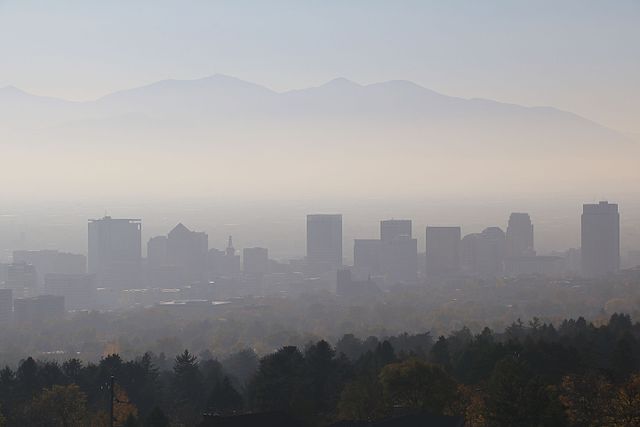Amid Setbacks, a Victory for Clean Air
Amid the federal government rollback of key environmental protections, states recently won a big victory with the EPA’s decision to move forward with implementing stricter air quality standards nationwide.
By Ande Troutman
Frontier Group intern Ande Troutman is a rising junior at Claremont McKenna College, majoring in Government.

Smog in Salt Lake City. (Wikimedia user Eltiempo10)
Amid the federal government rollback of key environmental protections, states recently won a big victory with the EPA’s decision to move forward with implementing stricter air quality standards nationwide.
In 2015, the Obama administration adopted new air quality standards, with enforcement beginning in October 2017. These standards, referred to as National Ambient Air Quality Standards, or NAAQS, limit ground level ozone. Ozone, a key component of smog, is linked to a variety of health problems, particularly for children and the elderly, and exacerbates lung diseases like asthma. According to the EPA, the new standards will have significant public health benefits. By 2050, the updated standards will avoid:
- 320 to 660 premature deaths
- 230,000 asthma attacks among children
- 160,000 days of missed school
- 28,000 missed work days, 630 asthma-related emergency room visits
- 340 cases of acute bronchitis among children
Fast-forward two years to the current administration, and EPA head Scott Pruitt proposed in June to delay implementation of the updated standards until October 2018.
Earthjustice, along with 14 states, including: Illinois, Iowa, New Mexico, and Pennsylvania filed suit against the EPA for trying to delay the implementation of stricter air quality regulations.
Fortunately, thanks to the push back from people, organizations, and states, Pruitt, in an uncharacteristic move, went back on his proposal to postpone the ozone rules and will go forward with the original deadline for enforcement. In an EPA press release, Pruitt commented on his decision, stating the importance of being “responsive to our state partners” and that keeping the current deadline “reinforces [the] commitment to working with the states.”
Support for stronger pollution standards spans demographics, regions of the country, and political alignment: 61% of Americans support stricter limits on smog, according to a poll released by the American Lung Association.
Americans have reason to celebrate this victory for clean air, but unfortunately the rule is not out of the woods yet: there is a bill right now, passed by the House and moving to the Senate, that seeks to push the deadline back eight years.
